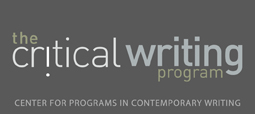Literature
An Overview of the Discipline
The study of literature examines and interprets the written text of a language, period, or culture. The word "literature" literally translates to "things made of letters." As such, literature is manifested in many forms such as novels, short stories, plays, and poems. This broad field of study can also be broken down into sub-disciplines. Penn offers courses that explore British, American, Renaissance, Medieval, Postcolonial, Transnational, and African American literature. Though the content of these sub-disciplines differs, their approaches to writing are very similar.
Reasoning and Evidence
Reasoning
Writing in literature is oftentimes justificatory with scholars typically forming a position on or interpretation. In some cases, a scholar will simply seek to explain the meaning of a certain text or poem. Many literary papers manifest a delicate interplay of such explanation and justification.
Evidence
At the undergraduate level, specific passages of a given text are the most crucial form of evidence. These concrete pieces of language provide the fundamental support for an ensuing argument, position, or explanation. In some analyses, it is also appropriate to draw upon biographical evidence of the author or the historical confluences that work within a given text. Though data-analysis in rare in this discipline, it can still be used in certain situations. An emerging field known as the digital humanities explores the intersection between computing and the disciplines of the humanities. This new disciplines utilizes techniques such as data visualization, text mining, and information retrieval – all quantitative methods of analysis.
The Writing Process
Authorship
Literature is one of the most individualistic disciplines. It is highly unusual for papers to be co-authored. However, particular subdisicplines, like contemporary poetry, may include a certain degree of collaboration amongst researchers.
Goal
Writing in literature most often constitutes an affirmation or critique of a position. One professor commented that, within the discipline, there are many "existing lines of arguments" staked out. The job of a literary scholar is to study these stances and refine or critique them.
Components of Good Literary Writing
- Style
- Organization
- Reasoning and Evidence
- Grammar and Mechanics
Style
Style is an essential component of literary scholarship. The strength of the topic and research alone are not necessarily sufficient when writing in this discipline. The discipline is competitive. Scholars wants their work to be read and accepted by their peers. It is therefore important to engage the audience and to attract interest in a given topic. Some scholars who are particularly successful in this discipline are noted for their distinctive styles.
Student Writing
Common Errors
As previously stated, writing in literature oftentimes involves making a certain claim about a given text. As such, students sometimes fail to take a firm, interpretive stance, instead opting to include multiple sides of the issue. Other students may struggle with finding the proper voice in their writing. In an attempt to mimic a more professional tone, student may use "inflated" or "artificial" rhetoric.
Writing Assignments
Undergraduate writing in literature typically takes the form of research papers and critical responses. Making an argument about a literary work by using textual examples is a fundamental skill of the discipline. Students may be asked to formulate a position on the literature before class, and these position papers provide a basis for discussion. Several creative assignments may include drafting a parody of a given text or inserting a foreign character into a particular scene. Such assignments challenge students to think critically about how the language of a text actually works, as well as how to imitate a particular style.
***May not be a big deal, but missing "Professional Writing"***
© 2013 The University of Pennsylvania
Meet the Professors

Dr. Jim English
Professor English specializes in modern and contemporary British fiction. His research interests include a unique, quantitative method of analyzing literature. This technique is rarely used in his discipline, but an emerging subdiscipline known as digital humantities oftentimes uses similar methods when engaging in reserach projects. More...

Dr. Al Filreis
Professor Filreis is a Kelly Professor and Faculty Director of the Kelly Writers House. He is particularly interested in the study of modern poetics. His most recent book, Counter Revolution of the Word, details the impact of Cold War anticommunist rhetoric on the modern American poetry movement. More...
